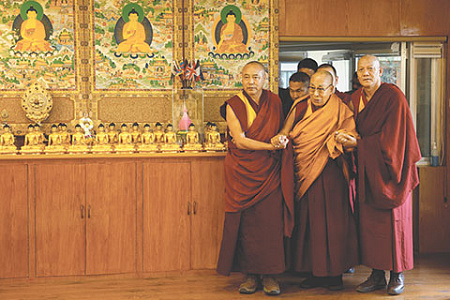
The Dalai Lama, the spiritual leader of Tibetans, will turn 90 on July 6. This is no longer the same man who easily moved around the world from his hiding place in Dharamsala, India, and answered reporters’ questions clearly and clearly in English. The years are taking their toll. And the entourage of this religious and political figure is worried that Beijing will take over the search for the reincarnation (rebirth) of the new Dalai Lama.
Almost seven decades have passed since the Dalai Lama and a group of his followers, who were trying to raise an uprising in Lhasa, the capital of Tibet, took refuge in India. There they began to create an administration that was supposed to provide assistance to Tibetan immigrants and represent their interests in international forums. The Western media called it the government of Tibet in exile. It was a distortion of reality. After all, the Dalai Lama himself said that he was not seeking independence for Tibet or its withdrawal from the PRC. The goal, he said, is for Tibet to become autonomous.
The administration has established a system of assistance to emigrants from Tibet in India and in some other countries. She established schools, clinics, monasteries, agricultural cooperatives, and even homes for the elderly. But the man who was the rallying force for Tibetan immigrants, who was the most recognizable face of Tibetans in the West and in Asia, has aged. His dream of Tibetan autonomy is becoming increasingly unrealistic. And the United States and its allies, according to The New York Times, are less and less eager to support the Tibetan diaspora in spite of China.
Anyway, the Dalai Lama promised that during the celebrations in honor of his 90th birthday, he would unveil a plan for choosing his heir. Tibetan tradition requires that the search for the reincarnation of the Dalai Lama begin after his death. When the new Dalai Lama is identified as an infant, it may take two decades for him to receive sufficient education and take over the reins of government. And here the question inevitably arises that Beijing will establish control over the process of selecting an heir.
The Dalai Lama hinted that it was possible not to follow the traditional rules in order to prevent Beijing from controlling the election of a successor. He made it clear that his heir could be selected from among the Tibetan emigrants. There are only 140,000 of them, half of whom live in India. The Dalai Lama also said that the heir can be an adult, not necessarily a man.
China has a template on how to conduct the inheritance process in Tibet. After the Panchen Lama, the second-highest spiritual mentor of the Tibetans, died in 1989, China found and raised its Panchen lama, not the one named by the Dalai. In early June, he met with Chinese President Xi Jinping and declared his commitment to the cause of the Communist Party.
Nevertheless, according to the American newspaper, the apparent interference of the Chinese authorities in the process of “succession to the throne” may cause protests among the Tibetan population of 6 million people. Tenzin Tsundu, an activist and poet living outside China, said, “The Dalai Lama was forced to live in exile for 65 years. This is causing discontent among Tibetans.”
In an interview with NG, Vasily Kashin, a senior researcher at the Higher School of Economics, noted: “During the period of Tibet’s stay in the Qing Empire, the Chinese government in the 18th century changed the procedure for electing a new reincarnation of the Dalai Lama by introducing the golden urn. This meant that when representatives of the Tibetan clergy formed a short list of candidates’ names, their names were placed in a “golden urn.” Next, the Chinese official pulled the name of the new supreme servant of the faith out of the urn. That is, the representative of China participated in the draw. China intends to preserve this ritual.
However, the compilation of the short list was preceded by a thorough search for boys in the areas of Tibet indicated by the ex-Dalai Lama. When candidates were found, they were shown the belongings of their deceased predecessor. The boy who got to know them more and usually became the Dalai Lama. He did not become a Buddha, but a bodhisattva, a being who decided to stay in this world in order to alleviate the suffering of people. That is, it is close to becoming a Buddha, but it wants to save people.”
According to the expert, India has its own population professing Buddhism, its other branch. For them, the Dalai Lama is not the highest authority. The Indian government is trying to limit the protests of Tibetan immigrants hostile to China. It does not want to aggravate relations with China. On the other hand, India is unlikely to recognize the new Dalai Lama, selected by the Chinese through the golden urn.
“There are Buddhists in Russia too. There are most of them in Buryatia, Tuva, and Kalmykia. There was a movement to invite the Dalai Lama to Russia. But Moscow refused to do this in order not to spoil relations with Beijing,” Kashin concluded.
